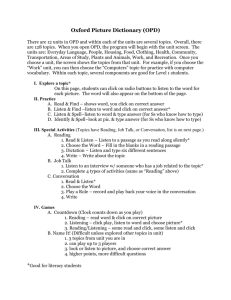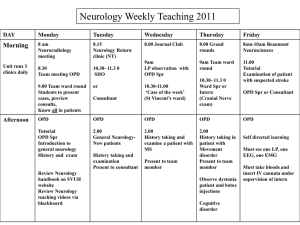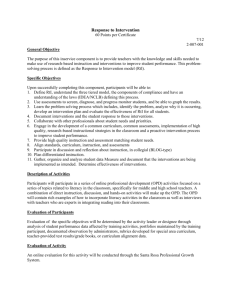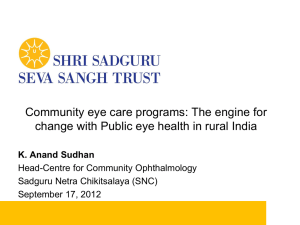A Practical Guide To Junior Internship
advertisement
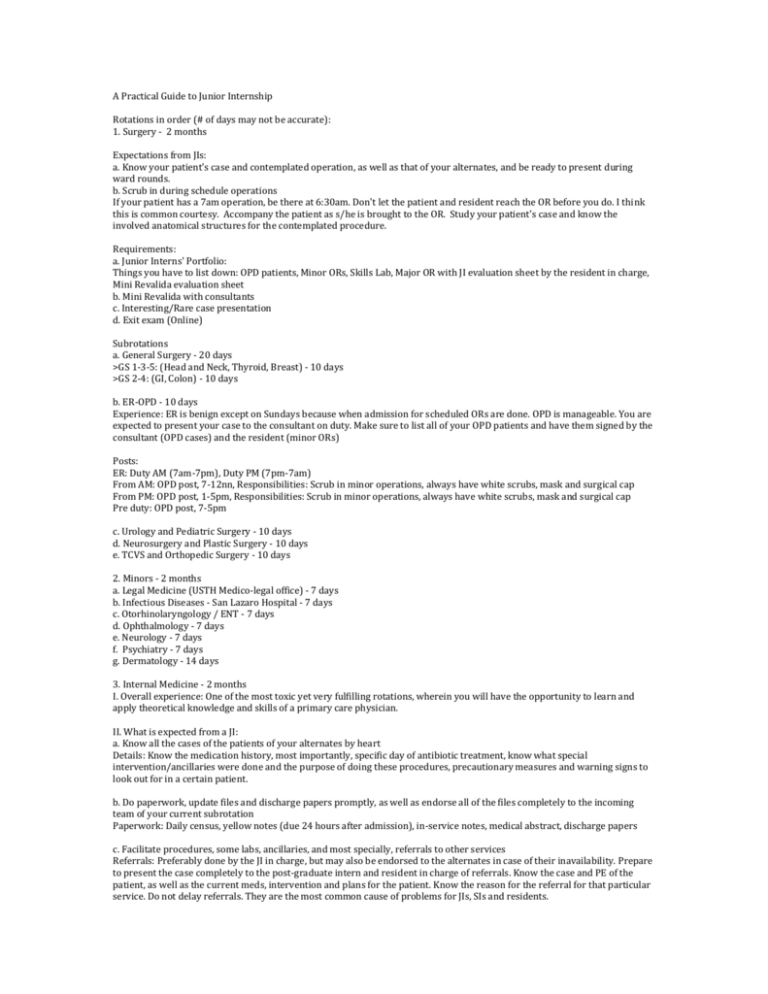
A Practical Guide to Junior Internship Rotations in order (# of days may not be accurate): 1. Surgery - 2 months Expectations from JIs: a. Know your patient's case and contemplated operation, as well as that of your alternates, and be ready to present during ward rounds. b. Scrub in during schedule operations If your patient has a 7am operation, be there at 6:30am. Don't let the patient and resident reach the OR before you do. I think this is common courtesy. Accompany the patient as s/he is brought to the OR. Study your patient's case and know the involved anatomical structures for the contemplated procedure. Requirements: a. Junior Interns' Portfolio: Things you have to list down: OPD patients, Minor ORs, Skills Lab, Major OR with JI evaluation sheet by the resident in charge, Mini Revalida evaluation sheet b. Mini Revalida with consultants c. Interesting/Rare case presentation d. Exit exam (Online) Subrotations a. General Surgery - 20 days >GS 1-3-5: (Head and Neck, Thyroid, Breast) - 10 days >GS 2-4: (GI, Colon) - 10 days b. ER-OPD - 10 days Experience: ER is benign except on Sundays because when admission for scheduled ORs are done. OPD is manageable. You are expected to present your case to the consultant on duty. Make sure to list all of your OPD patients and have them signed by the consultant (OPD cases) and the resident (minor ORs) Posts: ER: Duty AM (7am-7pm), Duty PM (7pm-7am) From AM: OPD post, 7-12nn, Responsibilities: Scrub in minor operations, always have white scrubs, mask and surgical cap From PM: OPD post, 1-5pm, Responsibilities: Scrub in minor operations, always have white scrubs, mask and surgical cap Pre duty: OPD post, 7-5pm c. Urology and Pediatric Surgery - 10 days d. Neurosurgery and Plastic Surgery - 10 days e. TCVS and Orthopedic Surgery - 10 days 2. Minors - 2 months a. Legal Medicine (USTH Medico-legal office) - 7 days b. Infectious Diseases - San Lazaro Hospital - 7 days c. Otorhinolaryngology / ENT - 7 days d. Ophthalmology - 7 days e. Neurology - 7 days f. Psychiatry - 7 days g. Dermatology - 14 days 3. Internal Medicine - 2 months I. Overall experience: One of the most toxic yet very fulfilling rotations, wherein you will have the opportunity to learn and apply theoretical knowledge and skills of a primary care physician. II. What is expected from a JI: a. Know all the cases of the patients of your alternates by heart Details: Know the medication history, most importantly, specific day of antibiotic treatment, know what special intervention/ancillaries were done and the purpose of doing these procedures, precautionary measures and warning signs to look out for in a certain patient. b. Do paperwork, update files and discharge papers promptly, as well as endorse all of the files completely to the incoming team of your current subrotation Paperwork: Daily census, yellow notes (due 24 hours after admission), in-service notes, medical abstract, discharge papers c. Facilitate procedures, some labs, ancillaries, and most specially, referrals to other services Referrals: Preferably done by the JI in charge, but may also be endorsed to the alternates in case of their inavailability. Prepare to present the case completely to the post-graduate intern and resident in charge of referrals. Know the case and PE of the patient, as well as the current meds, intervention and plans for the patient. Know the reason for the referral for that particular service. Do not delay referrals. They are the most common cause of problems for JIs, SIs and residents. III. Subrotations a. Hematology-Oncology-Rheumatology (HOR)-10 days Materials: box of slides and finger pricker for daily morning peripheral blood smears Experience: Benign except during the chemotherapy wave months (August-September). Learn how to do peripheral blood smears from your MedTech classmates. b. Pulmonology-Infectious Diseases - 10 days Experience: Toxic, because patients in this specialty are always in critical conditions and hooked to assistive devices that need to be monitored regularly, like hourly suctioning of ET tube; mostly admitted in the ICU with plenty of referrals to other services (Surgery, Neurology, Rehab Med) so be prepared to present and refer at anytime as soon as it is ordered in the chart. This is a cause of trouble when not carried out immediately. c. Cardiology-Gastroenterology - 10 days Experience: Benign, but if you will have a patient, you will be toxic, especially for critical cardio/ICU patients that need regular evaluation for signs of heart failure or an impending MI; they are also assigned as the official CPR and pastoral care services team (contacting the priest on duty) whenever there is a code during day duty; at night, the entire duty team takes these responsibilities. Always be ready with a pair of gloves and a mask at all times wherever you may be - you will be called in the most unlikely of situations and you must be prepared to perform good CPR. Your class may coordinate with the Life support training center (Dr.Larry King, Dra. Ruby Tiongson) regarding AHA ACLS courses so that you can all be scheduled by your overall group leader and approved by the JI supervisor for corresponding excused absences. For GI patients, always be on the lookout for GI danger signs (abdominal pain, jaundice, hematochezia, melena, constipation, diarrhea, etc) and know how to monitor drainage of fluids (ex. bile fro a JP drain) if applicable to your case. d. ER-OPD - 10 days Experience: Both rotations are toxic, but are good practice grounds for your oral revalida. So take on more patients and develop good and fast history-taking and PE, as well as presenting it well to the residents along with your plan of management. 4. Electives-1 month General Schedule: Mon-Fri: 8-5pm, Sat. 8-12nn, Sun. off duty Options: a. Cardiology b. Pulmonology c. Family Medicine Experience: d. Anesthesiology e. Pathology f. Rehabilitation Medicine g. Psychiatry-with night duties h. Radiology *you may take an elective rotation for 2 weeks. 5. Community Medicine-1 month Location: Dagat-dagatan, Navotas Transportation: provided by the school, with 2 trips per departure Attire: Official Community Medicine shirt with logo, pants, comfortable walking/working shoes that you wouldn't mind soiling 6. Pediatrics - 2 months a. OPD - 1 month, without night duties Mon-Fri, 8-5pm, Sat. 8-12nn b. Ward - 1 month, with night duties b.1.Nursery-7 days b.2.Fabella-7 days b.3.Ward-UST-remaining days Must-have materials: otoscope, pediatric BP cuff, tape measure, stethoscope (complete OPD PE bag) Experience: tolerable toxicity, plenty of conferences 7. Obstetrics and Gynecology - 2 months a. Obstetrics-UST-1 month Experience: tolerable toxicity, unpredictable patient load (you can have as many as 4 patients or more in your entire rotation), fast patient-turnover (esp. for NSDs, they get discharged 2 days post-op, so always be up to date with the discharge papers, residents are strict about this), maximum guided theoretical and skills-learning, plenty of conferences (you will be guided by the residents prior to the presentation, which is a good thing), has journal reporting/appraisal sessions b. Obstetrics-Fabella-14 days Experience: maximum toxicity and exposure to a good variety of cases, more of skills-formation, self-directed learning c. Gynecology-UST-14 days Experience: Benign if you don't have a patient, toxic if you have a patient especially if she has an interesting case because you can be assigned to present that case at multiple conferences (you will be guided by the residents prior to the presentation, which is a good thing). ORs are always scheduled unless the case is an emergency has journal reporting/appraisal sessions, maximum guided theoretical and skills-learning
